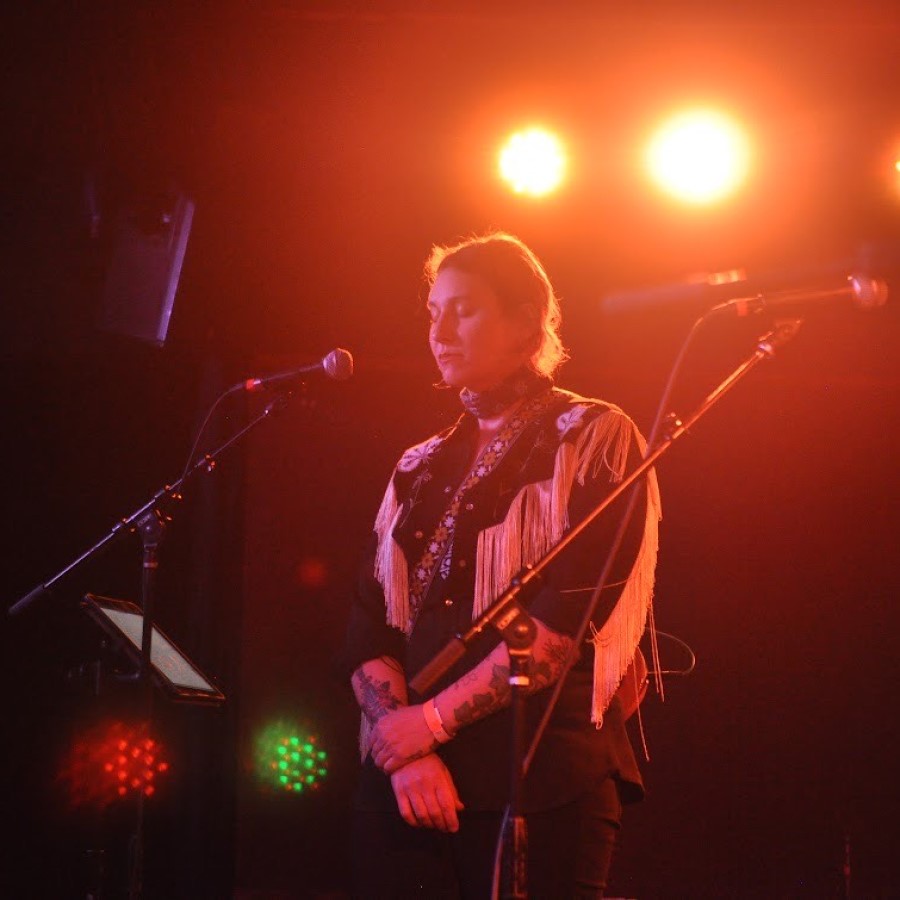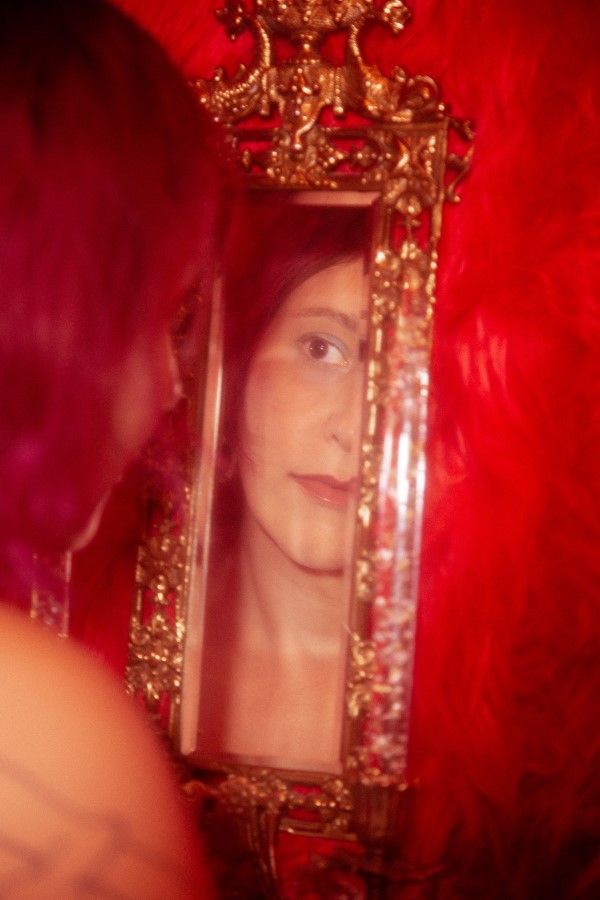Recently featured on Reba’s Top Ten remix of “I’m A Survivor” by Lafemmebear, at AmericanaFest 2021, and in the Tennessean, The Boot, ET, Nashville Scene/CMT, Esquire, Apple Music, and Rolling Stone, Mya Byrne’s “rootsy, soulful” tunes (Time Out) and electrifying performances draw comparisons to Lucinda Williams, Chris Stapleton, and The Band. Her new LP, produced by Grammy-nominated songwriter Aaron Lee Tasjan (New West), is due out in 2022. She recently created the theme music for Amazon Music’s new Country Heat Weekly podcast, hosted by Kelly Sutton. She was chosen by Rissi Palmer and Kelly McCartney as a 2022 Rainey Day Fund / Newport Folk grant recipient to support her new album, and has performed on many great stages, including Levon Helm’s Ramble and the Philadelphia Folk Festival, and collaborates with many of queer country’s brightest stars, including Paisley Fields, Adeem the Artist, and the legendary Lavender Country.

Byrne also makes films with San Francisco’s Periwinkle Cinema; her recent short on gay trans pioneer Lou Sullivan was highlighted as a centerpiece of the SF Trans Film Festival.
There’s a reason Byrne is on such a tear, and I for one am thrilled to see all the good things coming her way. Byrne is disciplined, compassionate songwriter on her own, and she’s also a consummate performer. When she’s on stage she can tear the roof off of the venue with her guitar pyrotechnics and draw you into the joy of music with the sublime smile that appears on her face as she loses herself to her art. Byrne never upstages her bandmates, but when it’s her turn to shine, you know she’s there. In the video below, taken at Americanafest with Aaron Lee Tasjan and Brian Wright and the Sneakups, Byrne tears into a song from her forthcoming album “Devil In My Ear.”
Music or lyrics first?
Lyrics first, though it’s a bit more complex than that! I always made up poems and stories as a child, and then later on I studied poetry. Before I ever played an instrument I was making up songs and stories, too. But I always carry a notebook, and am always grabbing ideas out of the air, out of what I hear around me, conversations I’m having, reactions to art or industrial ruins I might be witnessing, et cetera. So the lyrical stream is always going. I get separate musical ideas often and will record them into my phone, but I rarely write with an instrument. I usually write both melody and lyric while I’m walking, to the beat of my feet. I learned this from the late Jack Hardy, a great Greenwich Village folk musician. When I first started coming around to the workshop he hosted in New York, I would write these wildly complex chord progressions on guitar, and find a melody to wend its way in between—having gone to music school, that was a side effect!
But Jack had the theory that melody is most pure when it’s not influenced by an instrument, and told me to try it – that I’d find that my chords would be a whole lot simpler in a positive way, and the melody much more memorable if I let it stand on its own. For me, that was a really good practice in deliberate simplicity.
So I’d say 70 percent of my songs are written that way—I’ll get the lyrical idea, and set it to a melody that the lyrics and rhythm suggest, which usually comes at the same time. Sometimes I get really lucky and I’ll improvise a mostly formed song idea into my phone or DAW! I often of course get musical riff ideas and stuff like that, so I’ll record or write those down as well, but I find it harder to set lyrics to existing melodies and chord progressions. And if I’m collaborating with other artists, it’s more like passing the ball around, and listening to each other and coming up with a concept either lyrically or musically to roll with, so that’s 50/50.
Oftentimes, what will kick off a lyric will be a prompt from a songwriting friend. In the case of “Devil in My Ear,” it was a picture of a demon on someone’s shoulder from my friend Timmy Riordan, who runs a group called The Fearless Songwriter. A few times a year, about 20 of us will get together online and each write one song a day for a week, with Timmy providing the inspiration. I had a vague notion of the melody while I wrote the lyrics, and decided to write a melody that would go along with a drone-style riff I was playing guitar, along with a somewhat complicated B-section. Leading up to the studio, my buddy Aaron Lee Tasjan – a fantastic singer-songwriter who produced my new record — helped simplify the chord structure and that’s what it became.
Do you have any songwriting tips you can share?
Aside from the tips from Jack I mentioned? Hmmmmm…. Don’t be afraid to just write the damn thing. No one song is that precious! The more you write, the more you learn…let your imagination flow. Write write write…and try different styles of writing, like a laid back George Jones or Harlan Howard song, or a blues form, or a complicated Stevie Wonder or Joni Mitchell song, and try writing your own words to that melody, then coming up with a new one. You might not keep the song, but you’ll learn about form and meter. Even Picasso started out copying the masters, so why aren’t songwriters taught the same skill? That’s how ya learn!

And pick up this classic: Clement Wood’s Complete Rhyming Dictionary and The Poet’s Craft Book. You might not use the rhyme part as much as say RhymeZone.com or something, as it’s somewhat archaic, but in the Craft Book there are tons of examples of different classic poetical meters. It’s a veritable 2-year college writing course for less than ten bucks. Try writing sonnets on the subway commute! It’s fun! And carry a notebook!
How do you use your platform to support marginalized people?
I try use my privilege and my platform in any way I can to help make positive change in marginalized community. I’m lucky enough to be friends with some incredible BIPOC artists who I do my best to champion and who often help advise me on what I can do to help community. Sometimes that is talking about my collaborator Lafemmebear, or shining a light on Black-led arts organizations like Queer Rebels and Black Opry, or raising awareness of community organizations that specifically support Black trans folks, like Ali Forney Center, St. James Infirmary, and TGIJP.org. I have also advised a few other arts orgs that are trying in good faith to diversify ways they can change and referring them to BIPOC folks (and do my darndest to help diversify any bills that I am asked to play on, too). Outside of arts, I also do volunteer work with the San Francisco Needle Exchange and Mission Neighborhood Resource Center, directly supporting unhoused and mostly BIPOC neighbors in the Mission and Haight-Ashbury.
Most of all, I try my hardest to listen to any critique that comes my way. I’m learning, constantly, and always have more to learn.
How has your coming out journey played into your music?
I think coming out, for me, allowed me a sense of freedom I never had before. In my songs before I came out, there was this sense of frustration I always felt, like I was always searching for something that was missing. And thus my songs were extremely introspective in many ways, as opposed to observational. So I think what happened is by solving that “missing piece” question that my pre-coming out songs had, it enabled me to start looking at deeper truths, and to view the world from a different lens.
My songs to me feel very free, and open, and I feel now like what I’m saying is representative of me feeling at home in myself but able to see in the world around me, and therefore be at once more hopeful yet completely aware of the things I’m seeing and feeling. For instance, after a show last summer, someone came up to me, thanked me, and said, “I don’t know how you just made me cry yet simultaneously feel SO good about myself, but you did!” It’s a strange dichotomy. But knowing that folks feel that way has allowed me to engage with true joy, like I’m doing something so positive with my art.
What’s the best way a fan can support you?
I do this full-time, and the best way anyone can support me is by signing up at www.patreon.com/myabyrnemusic to support my basic living expenses. I post new songs weekly, and other stuff as well. <3
